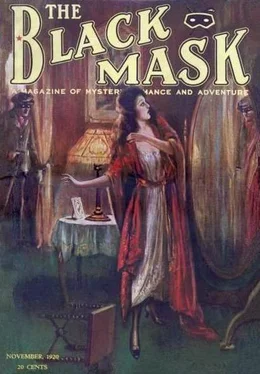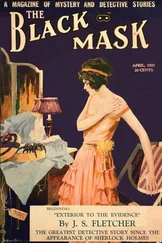Hamilton Craigie - The Black Mask Magazine (Vol. 2, No. 2 — November 1920)
Здесь есть возможность читать онлайн «Hamilton Craigie - The Black Mask Magazine (Vol. 2, No. 2 — November 1920)» весь текст электронной книги совершенно бесплатно (целиком полную версию без сокращений). В некоторых случаях можно слушать аудио, скачать через торрент в формате fb2 и присутствует краткое содержание. Город: New York, Год выпуска: 1920, Издательство: Pro-distributors Publishing Company, Жанр: Классический детектив, на английском языке. Описание произведения, (предисловие) а так же отзывы посетителей доступны на портале библиотеки ЛибКат.
- Название:The Black Mask Magazine (Vol. 2, No. 2 — November 1920)
- Автор:
- Издательство:Pro-distributors Publishing Company
- Жанр:
- Год:1920
- Город:New York
- ISBN:нет данных
- Рейтинг книги:5 / 5. Голосов: 1
-
Избранное:Добавить в избранное
- Отзывы:
-
Ваша оценка:
- 100
- 1
- 2
- 3
- 4
- 5
The Black Mask Magazine (Vol. 2, No. 2 — November 1920): краткое содержание, описание и аннотация
Предлагаем к чтению аннотацию, описание, краткое содержание или предисловие (зависит от того, что написал сам автор книги «The Black Mask Magazine (Vol. 2, No. 2 — November 1920)»). Если вы не нашли необходимую информацию о книге — напишите в комментариях, мы постараемся отыскать её.
The Black Mask Magazine (Vol. 2, No. 2 — November 1920) — читать онлайн бесплатно полную книгу (весь текст) целиком
Ниже представлен текст книги, разбитый по страницам. Система сохранения места последней прочитанной страницы, позволяет с удобством читать онлайн бесплатно книгу «The Black Mask Magazine (Vol. 2, No. 2 — November 1920)», без необходимости каждый раз заново искать на чём Вы остановились. Поставьте закладку, и сможете в любой момент перейти на страницу, на которой закончили чтение.
Интервал:
Закладка:
“Well, young Knibbs?” he queried, hopefully.
“She’s the image of original innocence—or original sin—God knows which. Doesn’t know a blasted thing about my hold-up; never met me; and all that. Oh, what’s the use?”
“A phrase not in my vocabulary,” replied Dreer. “Do you want me to arrest her?”
“Heavens, no! Send a girl—particularly as pretty a girl as she—to jail? I’d rather lose a few thousand more than do that.”
“What do you want me to do?”
“Get my trinkets back.”
Dreer became speculative.
“She may have carried this thing out on her own initiative, without the knowledge or consent of her parent, in which instance it’s hardly likely she would bring the loot home with her,” he muttered. “She’s been to a ‘fence,’ no doubt. However, I’ll have Yensen search the house and report to me tomorrow. There’s nothing we can do now, except perhaps make undertaking arrangements. This other affair is plainly suicide.”
They filed down the stairway, pausing at its foot for another chat with Hjalmar Yensen.
“My boy,” said Simeon Dreer to the big, raw-boned Swede, “I know you are a careful, conscientious officer. I know you are thorough. And I have a little job here that requires thoroughness more than anything else. It’s only a side-light on the suicide, but it may succeed in recovering some stolen personal property, and there’s always a reward attached to that sort of thing, you know. Now, Yensen, I want you to search this shack from cellar to garret for a diamond scarf pin shaped in a question mark, a Gruen watch, and an alligator wallet containing three hundred dollars in bills and a motor-car license made out to Fleming Metcalf Knibbs. Do your best to uncover these or anything else of interest, Incidentally, you might call in the matron from the Twenty-second District Station and have the girl searched, preferably without the knowledge of her father. When you are quite through, you and Haggerty may leave. Tell De Brunner we hold his household blameless; that the evidence of suicide is satisfactory to the department, and he will not be intruded upon again, though, of course, the final judgment is in the coroner’s hands. Meanwhile, we shall summon an undertaker. Good-bye.”
And they went out.
III
Knibbs was awakened about nine o’clock the following morning by the ringing of the telephone bell. He arose, grumbling between yawns, and wended his barefooted way to the instrument.
“Hello!” he said briefly.
“That you, young Knibbs?” asked Dreer’s voice at the other end.
Fleming’s sleepiness vanished. Perhaps the old fellow had some interesting information about his half-asleep girl, of whom he had dreamed the whole night through.
“Yes, Mr. Dreer,” he replied. “What is it? A new development in our case?”
“No; it’s about the suicide, but I knew you’d be interested—thought you’d like to follow it up, you know, because—well, because the little girl is tied up in it, and—”
“Yes, yes—of course. What have you found?”
“A meagre clue. It may and may not be of importance.” Dreer was always modest. “If you care to come over, we’ll examine its possibilities together.”
“But I thought the incident of the suicide was closed. I thought the department was satisfied.”
“The department is never satisfied so long as a shadow of suspicion remains undispelled. To be brutally frank, young Knibbs, there is a possibility that Lola De Brunner murdered the man Ulrich!”
“No!”
“Yes—a possibility. I do not say it with assurance, and I hope, if only because of your interest in her, that it proves untrue. But it is there and cannot be avoided. As I said, if you care to come over—”
“Wait for me. I’ll be over in a jiffy,” cried Fleming.
He slammed the receiver on its hook, and a moment later was getting into his clothes with reckless haste. The girl Lola had taken a peculiar hold on him. Though the unusual circumstances of their meeting, not to mention the depressing incidents which followed, were certainly not—on their face, at least — of a nature to awaken the finer instincts, these instincts were awakened, nevertheless, in Fleming Knibbs, and, coming to analyze it that beautiful September morning, he concluded that it was so because there was something real about this girl that rose above the most damning facts, refuting them.
In brief, anything bad she had done wasn’t true. He-clung to this assertion because it was the only ground on which he could satisfactorily explain his attraction to her. He knew he wouldn’t be drawn to a girl essentially bad; ergo folks had merely gotten the wrong angle on her acts and misunderstood them.
True, he had a difficult mental battle maintaining this stand. Inevitable logic came forward again and again, arguing: “If a man approached you on the street, thrust a gun in your face, and relieved you of your valuables, he would be a thief, wouldn’t he—a common highwayman? If a girl — no matter how pretty — does the same thing, is she not a thief also?” That was a stumper. Knibbs had to find a way to answer No so that he would believe it. And he did. But how he did is beyond the comprehension of any save those who, too, are under the spell of some lovely young woman.
Fleming Knibbs sacrificed breakfast that morning in his eagerness to see Dreer. Just forty-five minutes elapsed between the ringing of his phone and the instant he walked, unannounced, into the detective’s strangely cluttered library.
Simeon Dreer was seated with his ear close to the phonograph, listening dreamily to the strains of Les Millions d’Arlequin. As his visitor entered, he raised his hand, without turning, in a request for silence.
Knibbs sat down and waited impatiently for the music to cease.
When it did, finally, Dreer, muttering “beautiful, beautiful,” put the record away with great care and deliberation before joining his guest.
Then, fumbling in his pocket, he brought forth an envelope.
“This,” he said, “was found by my good friend Yensen, and earned him a five-dollar bill.”
“And this was all he found?” queried Knibbs. “No sign of the watch or scarf pin?”
“None. The girl asked him, you see, to help move her father to a back room, which he did. Afterward he discovered this missive under the pillow. Tactfully maintaining silence, he brought it to me. Of your trinkets, however, young Knibbs, there was not a sign.”
Fleming looked at the envelope. It was addressed in a rangy scrawl to Bastian De Brunner and bore an Australian postmark dated six weeks earlier. Within was a sheet of linen letter paper. He drew it out and read:
Dear Bastian,
By the time this arrives you should be snugly fixed in your new quarters, I have no difficulty picturing you there; silent, of course; perhaps even brooding, but just as active in thought as ever.
How is Lola? Ask her, for me, if the trans-Pacific trip succeeded in lessening the intensity of her hatred for our mutual friend John Ulrich?
I am still with the old Smith & Townsend outfit, though I’ll admit the routine is getting to be drudgery. Some day I may clear out for the States myself. In which event, you may be sure I’ll look you up.
Trusting your health is improving, I remain
Your friend and admirer,
Cassius Wynn.Knibbs glanced at Simeon Dreer, frowning. “So you think, because, she entertained a dislike for the man Ulrich, that she killed him, and that her father is protecting her with his suicide story?”
“A natural assumption, isn’t it?”
Fleming, being reluctant to admit it, remained silent.
“Young Knibbs,” continued Simeon, “at what hour did this girl hold you up?”
Читать дальшеИнтервал:
Закладка:
Похожие книги на «The Black Mask Magazine (Vol. 2, No. 2 — November 1920)»
Представляем Вашему вниманию похожие книги на «The Black Mask Magazine (Vol. 2, No. 2 — November 1920)» списком для выбора. Мы отобрали схожую по названию и смыслу литературу в надежде предоставить читателям больше вариантов отыскать новые, интересные, ещё непрочитанные произведения.
Обсуждение, отзывы о книге «The Black Mask Magazine (Vol. 2, No. 2 — November 1920)» и просто собственные мнения читателей. Оставьте ваши комментарии, напишите, что Вы думаете о произведении, его смысле или главных героях. Укажите что конкретно понравилось, а что нет, и почему Вы так считаете.












